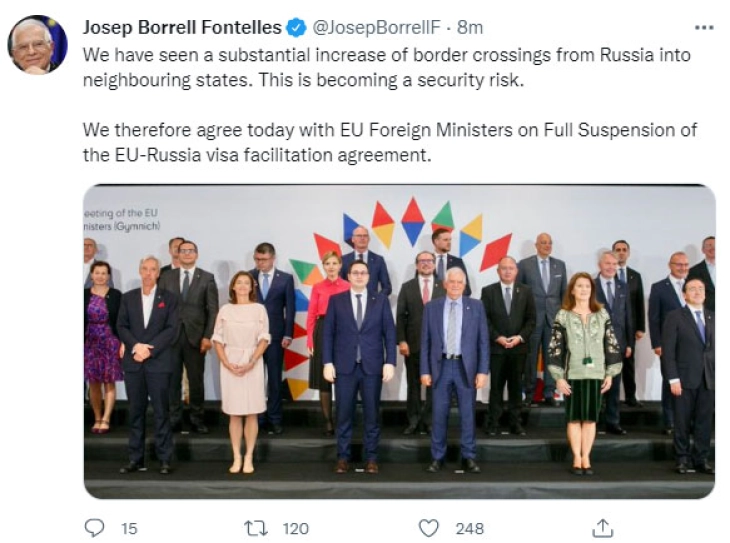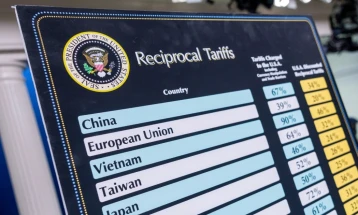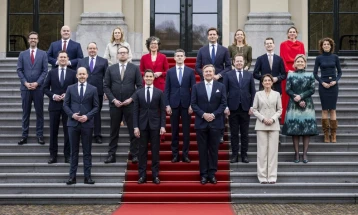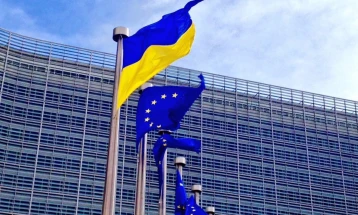EU suspends visa accord but stops short of wider Russian tourist ban

Brussels, 31 August 2022 (dpa/MIA) - EU foreign ministers have agreed to suspend a 2007 visa facilitation agreement with Russia over the country's war in Ukraine, top EU diplomat Josep Borrell announced on Wednesday.
The move is designed to prevent "visa shopping" by Russian applicants seeking easier entry to the European Union through member states with laxer rules, the EU foreign policy chief said in a press conference in Prague.
The suspension comes after weeks of pressure from EU countries bordering Russia to crack down on Russian nationals travelling to the bloc on Schengen visas issued by some EU member states.
Such a move would make the EU visa process more complicated, more expensive and more bureaucratic, as well as increasing waiting times for approval, according to European Commission guidelines.
For example, the suspension drops a basic application fee of €35 ($35.10), ends a standard application period of 10 days, and widens the tighter rules to all Russian applicants.
Previously a partial suspension, agreed in February and effective since May, applied to Russian government officials and business leaders.
A visa issued by any one country grants access to all 26 members of the Schengen passport-free zone.
The political agreement does not prevent, however, Russian nationals from travelling to the European Union despite a major push from the Czech Republic, the Baltics and Finland to secure this.
"It will still be possible to get visas," Borrell acknowledged but stressed that the travel documents, while available, will be issued in much reduced numbers due to the decision.
EU foreign ministers also instructed the European Commission to examine the issue of existing Schengen visas issued to Russian citizens.
There are currently 12 million Schengen visas in circulation held by Russian citizens, according to Czech Foreign Minister Jan Lipavský. "It's quite a complex question. There is no quick fix," he said.
The meeting also underlined individual EU member states' ability to take additional steps to limit border crossings in accordance with the Schengen travel regulations, Borrell said.
Edgars Rinkēvičs, Latvia's foreign minister, said on Twitter after the meeting that his country "and other neighbouring countries of Russia are entitled to introduce additional measures to guarantee their security by limiting border crossings."
The question of whether to suspend visas for Russian tourists dominated the informal meeting in Prague with division evident between Russia's closest EU neighbours and the bloc's Western members.
The idea of restricting Russian tourists entering the EU emerged in recent weeks as countries have witnessed Russians arriving for summer holidays via neighbouring EU countries.
Having "primarily rich Russians who come to Europe to go shopping," is not a good situation in light of the invasion of Ukraine, Dutch Foreign Minister Wopke Hoekstra said at the start of the talks.
Denmark's Foreign Minister Jeppe Kofod highlighted the disparity facing Ukrainian and Russian men amid the war. While Ukrainians are not permitted to leave the country and "must fight the invaders," Russian men "are having vacations in ... southern Europe."
Germany and France rejected a proposed blanket ban ahead of the talks. In a joint position paper circulated to the EU member states and seen by dpa, they said they feared "unintended rallying-around-the-flag effects" in Russia.
German Foreign Minister Annalena Baerbock repeated her opposition on Wednesday, saying she fears such a ban would impact dissidents and journalists fleeing the Kremlin regime.
The EU needs "the courageous voices that dare to stand up against the regime even after six months of war."
"We need them to continue," she said.
As the foreign ministers' meeting in Prague is taking place informally, no legal decision is possible.
A qualified majority vote of 15 members, or EU countries representing at least 65% of the bloc's population, is required to suspend the visa facilitation agreement.







